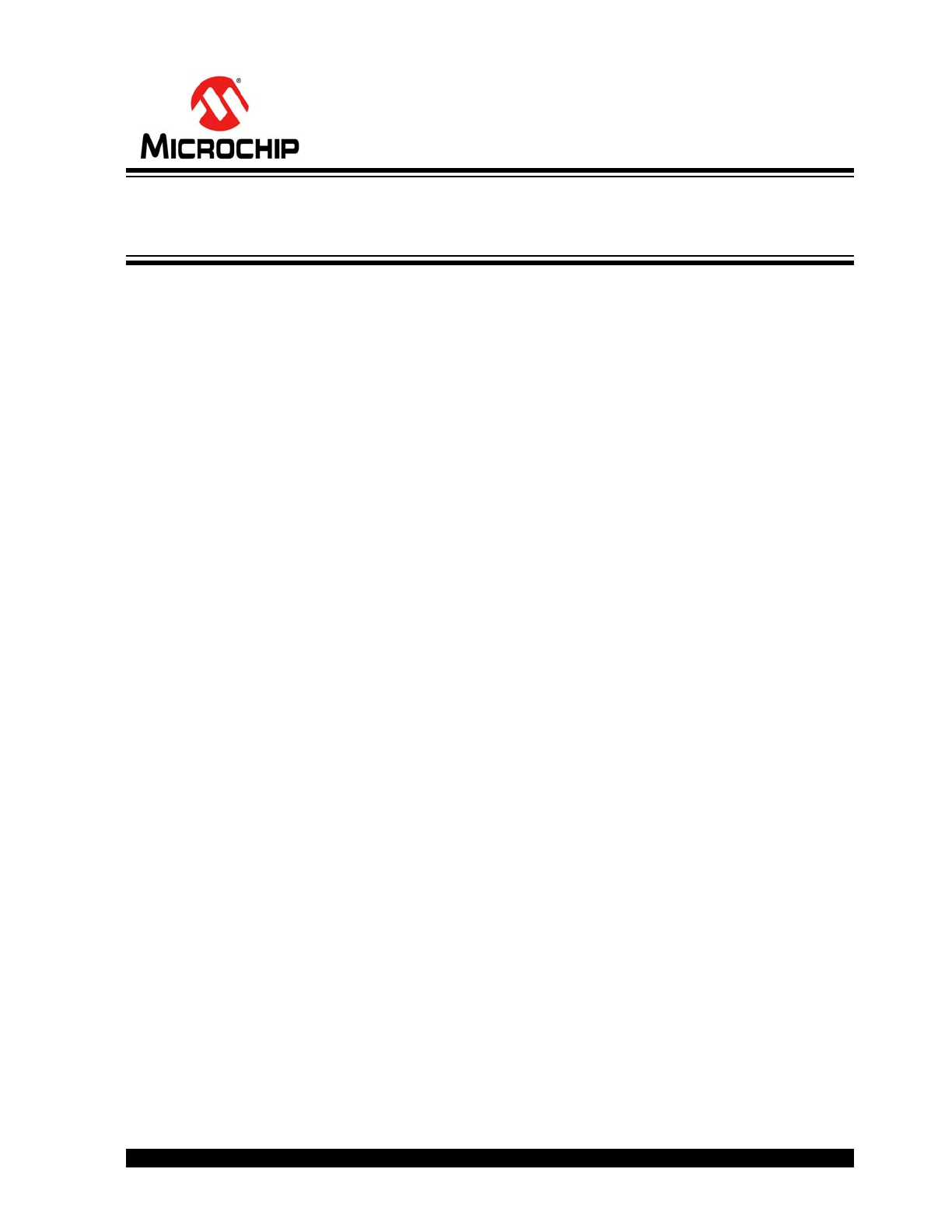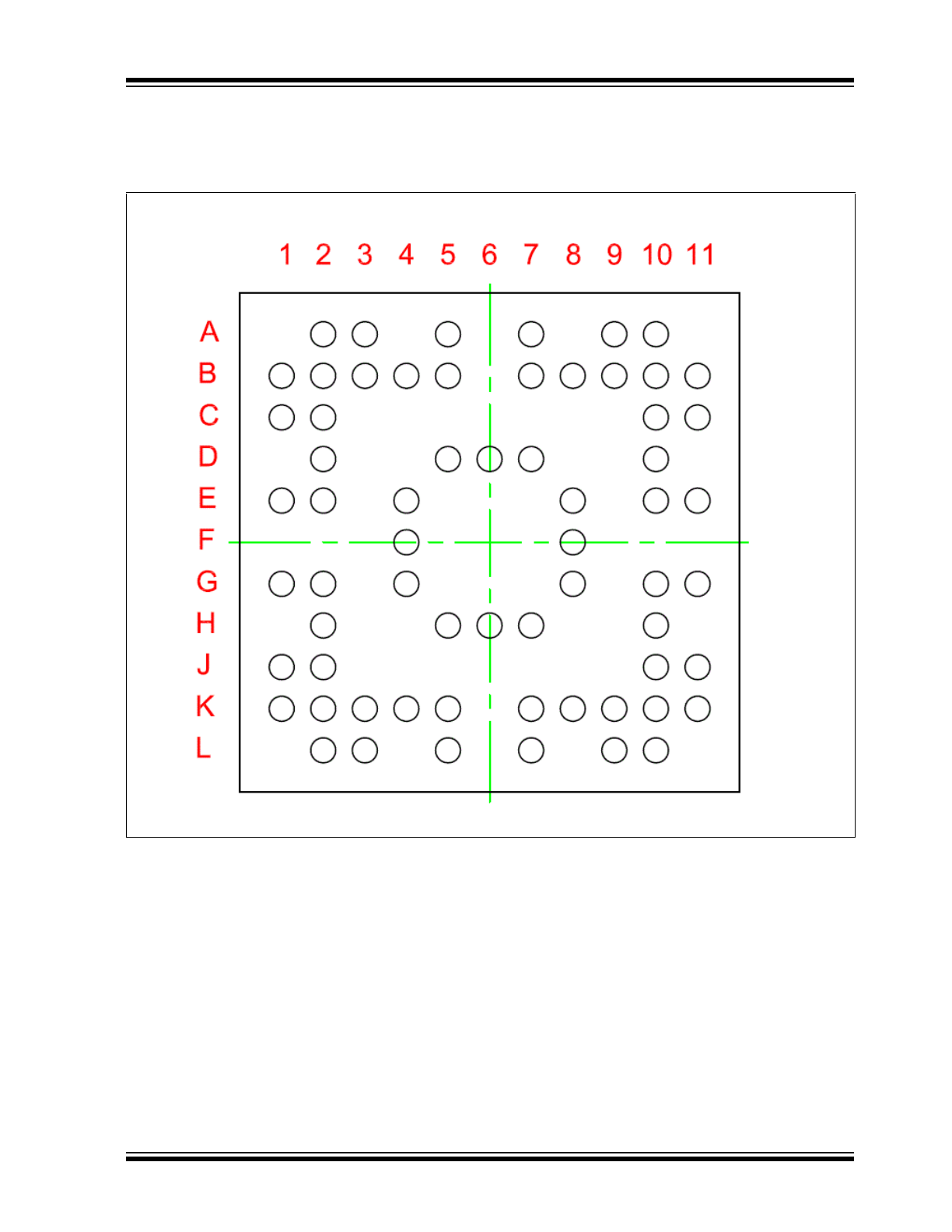
2015 Microchip Technology Inc.
DS00002028B-page 1
Product Features
• General Features
- 3.3 Volt Operation
(SIO Block is 5 Volt Tolerant)
- Programmable Wake-up Event (PME) Inter-
face
- PC99, PC2001 Compliant
- ACPI 2.0 Compliant
- Serial IRQ Interface Compatible with Serial-
ized IRQ Support for PCI Systems
- ISA Plug-and-Play Compatible Register Set
- Four Address Options for Power On Configu-
ration Port
- System Management Interrupt (SMI)
- 19 General Purpose I/O pins, 2 with VID
compatible inputs
- Security Key Register (32 byte) for Device
Authentication
• Low Pin Count Bus (LPC) Interface
- Supports LPC Bus frequencies of 19MHz to
33MHz
• Watchdog Timer
• Resume and Main Power Good Generator
• Programmable Clock Output to 16Hz
• 2 Full Function Serial Ports
- High Speed NS16C550A Compatible UARTs
with
- Send/Receive 16-Byte FIFOs
- Supports 230k, 460k, 921k and 1.5M Baud
- Programmable Baud Rate Generator
- Modem Control Circuitry
- 480 Address and 15 IRQ Options
- Support IRQ Sharing among serial ports
- RS485 Auto Direction Control Mode
• Hardware Monitor
- Monitor Power supplies (+2.5V, +5V, +12V,
Vccp (processor voltage), VCC, Vbat and Vtr.
- Remote Thermal Diode Sensing for One
External Temperature Measurement accurate
to 1.5
o
C
- Internal Ambient Temperature Measurement
- Limit Comparison of all Monitored Values
- One Programmable Automatic FAN control
based on temperature
• IDE Reset Output and 3 PCI Reset Buffers with
Software Control Capability
• Power Button Control and AC Power Failure
Recovery
• Temperature Range Available
- Industrial (+85
C to -40C)
- Commercial (+70
C to 0C)
• 64-Ball WFBGA RoHS Compliant Package
SCH3223
LPC IO with Reset Generation, HWM and
Multiple Serial Ports

SCH3223
DS00002028B-page 2
2015 Microchip Technology Inc.
TO OUR VALUED CUSTOMERS
It is our intention to provide our valued customers with the best documentation possible to ensure successful use of your Microchip
products. To this end, we will continue to improve our publications to better suit your needs. Our publications will be refined and
enhanced as new volumes and updates are introduced.
If you have any questions or comments regarding this publication, please contact the Marketing Communications Department via
E-mail at
docerrors@microchip.com
. We welcome your feedback.
Most Current Data Sheet
To obtain the most up-to-date version of this data sheet, please register at our Worldwide Web site at:
http://www.microchip.com
You can determine the version of a data sheet by examining its literature number found on the bottom outside corner of any page.
The last character of the literature number is the version number, (e.g., DS30000000A is version A of document DS30000000).
Errata
An errata sheet, describing minor operational differences from the data sheet and recommended workarounds, may exist for cur-
rent devices. As device/documentation issues become known to us, we will publish an errata sheet. The errata will specify the
revision of silicon and revision of document to which it applies.
To determine if an errata sheet exists for a particular device, please check with one of the following:
• Microchip’s Worldwide Web site;
http://www.microchip.com
• Your local Microchip sales office (see last page)
When contacting a sales office, please specify which device, revision of silicon and data sheet (include -literature number) you are
using.
Customer Notification System
Register on our web site at
www.microchip.com
to receive the most current information on all of our products.

2015 Microchip Technology Inc.
DS00002028B-page 3
SCH3223
Table of Contents
1.0 General Description ........................................................................................................................................................................ 4
2.0 Pin Layout ....................................................................................................................................................................................... 5
3.0 Block Diagram ............................................................................................................................................................................... 13
4.0 Power Functionality ....................................................................................................................................................................... 14
5.0 SIO Overview ................................................................................................................................................................................ 17
6.0 LPC Interface ................................................................................................................................................................................ 18
7.0 Serial Port (UART) ........................................................................................................................................................................ 20
8.0 Power Management ...................................................................................................................................................................... 36
9.0 Serial IRQ ..................................................................................................................................................................................... 37
10.0 General Purpose I/O (GPIO) ....................................................................................................................................................... 40
11.0 System Management Interrupt (SMI) .......................................................................................................................................... 45
12.0 PME Support ............................................................................................................................................................................... 46
13.0 Watchdog Timer .......................................................................................................................................................................... 48
14.0 Programmable Clock Output ....................................................................................................................................................... 49
15.0 Reset Generation ........................................................................................................................................................................ 50
16.0 Buffered PCI Outputs .................................................................................................................................................................. 53
17.0 Power Control Features .............................................................................................................................................................. 55
18.0 Low Battery Detection Logic ....................................................................................................................................................... 62
19.0 Battery Backed Security Key Register ........................................................................................................................................ 64
20.0 Temperature Monitoring and Fan Control ................................................................................................................................... 66
21.0 Hardware Monitoring Register Set ............................................................................................................................................ 100
22.0 Config Registers ....................................................................................................................................................................... 137
23.0 Runtime Registers .................................................................................................................................................................... 150
24.0 Valid Power Modes ................................................................................................................................................................... 169
25.0 Operational Description ............................................................................................................................................................ 170
26.0 Timing Diagrams ....................................................................................................................................................................... 178
27.0 Package Outline ........................................................................................................................................................................ 188
Appendix A: ADC Voltage Conversion .............................................................................................................................................. 189
Appendix B: Example Fan Circuits ................................................................................................................................................... 190
Appendix C: Revision History ........................................................................................................................................................... 193
Product Identification System ........................................................................................................................................................... 194
The Microchip Web Site .................................................................................................................................................................... 195
Customer Change Notification Service ............................................................................................................................................. 195
Customer Support ............................................................................................................................................................................. 195

SCH3223
DS00002028B-page 4
2015 Microchip Technology Inc.
1.0
GENERAL DESCRIPTION
The SCH3223 is a 3.3V (Super I/O Block is 5V tolerant) PC99/PC2001 compliant Super I/O controller with an LPC inter-
face. The SCH3223 also includes Hardware Monitoring capabilities, enhanced Security features, Power Control logic
and Motherboard Glue logic.
SCH3223 The SCH3223 incorporates Super I/O functionality including LPC bus interface, a Serialized IRQ interface
and the ISA Plug-and-Play standard register set (Version 1.0a). The I/O Address and hardware IRQ of each logical
device in the SCH3223 may be reprogrammed through the internal configuration registers. Related functionality offers
flexibility to the system designer, with General Purpose I/O control functions, and control of two LED's.
The SCH3223's Hardware Monitoring capability includes temperature, voltage and fan speed monitoring. It has the abil-
ity to alert the system of out-of-limit conditions and automatically control the speed of a fan via PWM and Tach pins.
There are four analog inputs for monitoring external voltages of +5V, +2.5V, +12V and Vccp (core processor voltage),
as well as internal monitoring of its VCC, VTR, and Vbat power supplies. The SCH3223 includes support for monitoring
one external temperature via thermal diode inputs and an internal sensor for measuring ambient temperature. The hard-
ware monitoring block of the SCH3223 is accessible via the LPC bus. Interrupt events can create PME wakeup events.
The Motherboard Glue logic includes various power management and system logic including generation of nRSMRST
and reset generation. The reset generation includes a watchdog timer which can be used to generate a reset pulse. The
width of this pulse is selectable via an external strapping option.
The two serial ports are fully functional NS16550 compatible UARTs that support data rates up to 1.5 Mbps. The Serial
Ports contain programmable direction control, which can automatically drive nRTS based on the status of the Output
Buffer.
The SCH3223 is ACPI 1.0/2.0 compatible and therefore supports multiple low power-down modes.
CAUTION: This device contains circuits which must not be used because their pins are not brought out of the package,
and are pulled to known states internally. Any features, and especially Logical Devices, that are not listed in this docu-
ment must not be activated or accessed. Doing so may cause unpredictable behavior and/or excessive currents, and
therefore may damage the device and/or the system.
1.1
Reference Documents
1.
Intel Low Pin Count Specification, Revision 1.0, September 29, 1997
2.
PCI Local Bus Specification, Revision 2.2, December 18, 1998
3.
Advanced Configuration and Power Interface Specification, Revision 1.0b, February 2, 1999

2015 Microchip Technology Inc.
DS00002028B-page 5
SCH3223
2.0
PIN LAYOUT
This is a 64-ball 6mm x 6mm package, with ball pitch of 0.5mm. However, the sparse 0.5mm pitch ball array allows
0.65mm trace routing rules. For a specific recommendation, see the drawing in
Section 27.0, "Package Outline," on
page 188
.
FIGURE 2-1:
SCH3223 64-BALL WFBGA FOOTPRINT DIAGRAM, TOP VIEW

SCH3223
DS00002028B-page 6
2015 Microchip Technology Inc.
2.1
SCH3223 Pin Layout Summary
TABLE 2-1:
SCH3223 SUMMARY
Ball#
Function (
Note 1
)
B1
+12V_IN
C1
+5V_IN
C2
VTR
D2
TEST=VSS
E2
VSS
E1
CLOCKI
E4
LAD0
F4
LAD1
G4
LAD2
G2
LAD3
G1
LFRAME#
H6
PCI_RESET#
H5
PCI_CLK
H2
SER_IRQ
J2
VSS
K3
VCC
J1
nIDE_RSTDRV / GP44
K2
nPCIRST1 / GP45
K1
nPCIRST2 / GP46
L2
nPCIRST3 / GP47
L3
AVSS
K4
VBAT
K5
GP27 / nIO_SMI
L5
VTR
L9
nRI1
L10
nDCD1
K11
RXD1
K7
TXD1
K8
nDSR1
K9
nRTS1 / SYSOPT0
K10
nCTS1
J10
nDTR1 / SYSOPT1
J11
GP50 / nRI2
H10
VTR
L7
VSS
H7
GP51 / nDCD2
G11
GP52 / RXD2
G10
GP53 / TXD2
G8
GP54 / nDSR2
F8
GP55 / nRTS2 / RESGEN
E8
GP56 / nCTS2
D6
GP57 / nDTR2
D7
PB_OUT#

2015 Microchip Technology Inc.
DS00002028B-page 7
SCH3223
Note 1:
Device ID register at Plug&Play Index 0x20 holds 0x7D.
2.2
Pin Functions
E10
PS_ON#
E11
PB_IN#
D10
SLP_SX#
C11
GP42 / nIO_PME
C10
GP61 / nLED2 / CLKO
B11
GP60 / nLED1 / WDT
A10
GP63
B10
CLKI32
A9
nRSMRST
B9
GP62
B8
PWRGD_OUT
B7
PWRGD_PS
A7
nFPRST / GP30
A5
PWM1
B5
FANTACH1
D5
HVSS
B4
HVTR
B3
REMOTE1-
A3
REMOTE1+
B2
VCCP_IN
A2
+2.5V_IN
TABLE 2-2:
SCH3223 PIN FUNCTIONS DESCRIPTION
Note
Name
Description
VCC
Power
Plane
VTR
Power
Plane
VCC=0
Operation
(
Note 2-10
)
Buffer
Modes
(
Note 2-1
)
POWER PINS
2-3
,
2-4
VCC
+3.3 Volt Supply Voltage
2-3
,
2-4
VTR
+3.3 Volt Standby Supply
Voltage
2-6
VBAT
+3.0 Volt Battery Supply
)
VSS
Ground
AVSS
Analog Ground
2-3
HVTR
Analog Power. +3.3V VTR
pin dedicated to the
Hardware Monitoring
block.
HVTR is powered
by +3.3V Standby power
VTR.
TABLE 2-1:
SCH3223 SUMMARY (CONTINUED)
Ball#
Function (
Note 1
)

SCH3223
DS00002028B-page 8
2015 Microchip Technology Inc.
2-3
HVSS
Analog Ground. Internally
connected to all of the
Hardware Monitoring Block
circuitry.
CLOCK PINS
CLKI32
32.768kHz Trickle Clock
Input
CLKI32
No Gate
IS
CLOCKI
14.318MHz Clock Input
CLOCKI
IS
LPC INTERFACE
LAD[3:0]
Multiplexed Command
Address and Data
LAD[3:0]
GATE/ Hi-Z
PCI_IO
LFRAME#
Frame signal. Indicates
start of new cycle and
termination of broken cycle
LFRAME#
GATE
PCI_I
PCI_RESET#
PCI Reset
PCI_RESET#
NO GATE
PCI_I
PCI_CLK
PCI Clock
PCI_CLK
GATE
PCI_ICLK
SER_IRQ
Serial IRQ
SER_IRQ
GATE / Hi-Z
PCI_IO
SERIAL PORT 1 INTERFACE
RXD1
Receive Data 1
RXD1
GATE
IS
TXD1
Transmit Data 1
TXD1
HI-Z
O12/O12
nDSR1
Data Set Ready 1
nDSR1
GATE
I
2-5
nRTS1 /
SYSOPT0
Request to Send 1/
SYSOPT (Configuration
Port Base Address Control)
nRTS1/
SYSOPT0
GATE/ Hi-Z
OP14 / I
nCTS1
Clear to Send 1
nCTS1
GATE
I
nDTR1 /
SYSOPT1
Data Terminal Ready 1
nDTR1 /
SYSOPT1
GATE/ Hi-Z
O6 / I
2-7
nRI1
Ring Indicator 1
nRI1
GATE
IS
nDCD1
Data Carrier Detect 1
nDCD1
GATE
I
SERIAL PORT 2 INTERFACE
2-7
GP50 / nRI2
Ring Indicator 2
GP50
nRI2
NO GATE/
HI-Z
(I/OD8/OD8) /
IS
2-7
GP51 / nDCD2
Data Carrier Detect 2
GP51 /
nDCD2
NO GATE/
HI-Z
(I/OD8/OD8) /
I
2-7
GP52 / RXD2
Receive Data 2
GP52 / RXD2
NO GATE/
HI-Z
(I/OD8OD8) /
IS
2-9
,
2-7
GP53 / TXD2
Transmit Data 2
GP53 / TXD2
NO GATE/
HI-Z
(I/O12/OD12)
/ (O12/OD12)
2-7
GP54 / nDSR2
Data Set Ready 2
GP54 /
nDSR2
NO GATE/
HI-Z
(I/OD8/OD8) /
I
2-7
2-11
GP55 / nRTS2 /
RESGEN
Request to Send 2 /
Reset Generator Pulse
Width Strap Option
GP55 / nRTS2
/
RESGEN
NO GATE/
HI-Z
(I/O8/OD8) / I
/ IOP8
2-7
GP56 / nCTS2
Clear to Send 2
GP56 / nCTS2
NO GATE/
HI-Z
(I/OD8OD8) /
I
2-7
GP57 / nDTR2
Data Terminal Ready 2
GP57 / nDTR2
NO GATE/
HI-Z
(I/OD8OD8) /
O6
TABLE 2-2:
SCH3223 PIN FUNCTIONS DESCRIPTION (CONTINUED)
Note
Name
Description
VCC
Power
Plane
VTR
Power
Plane
VCC=0
Operation
(
Note 2-10
)
Buffer
Modes
(
Note 2-1
)

2015 Microchip Technology Inc.
DS00002028B-page 9
SCH3223
MISCELLANEOUS PINS
GP42/
nIO_PME
General Purpose I/O.
Power Management Event
Output. This active low
Power Management Event
signal allows this device to
request wake-up in either
S3 or S5 and below.
GP42/
nIO_PME
NO GATE
(I/O12/OD12)
/(O12/OD12)
2-6
,
2-7
GP60
/nLED1
/WDT
General Purpose I/O
/nLED1
Watchdog Timer Output
GP60
/nLED1
/WDT
NO GATE
(I/O12/OD12)
/(O12/OD12)
/(O12/OD12)
nFPRST /
GP30
Front Panel Reset /
General Purpose IO
nFPRST /
GP30
NO GATE
ISPU_400 /
(I/O4/OD4)
PWRGD_PS
Power Good Input from
Power Supply
PWRGD_P
S
NO GATE
ISPU_400
PWRGD_OUT
Power Good Output –
Open Drain
PWRGD_
OUT
NO GATE
OD8
nRSMRST
Resume Reset Output
nRSMRST
NO GATE
OD24
2-6
,
2-7
GP61
/nLED2 /
CLKO
General Purpose I/O
/nLED2
/ Programmable Clock
Output
GP61
/nLED2 /
CLKO
NO GATE
(I/O12/OD12)
/ (O12/OD12)
/ (O12/OD12)
2-7
GP27 /nIO_SMI
General Purpose I/O
/System Mgt. Interrupt
GP27
/nIO_SMI
GP27
/
HI-Z
(I/O12/OD12)
/(O12/OD12)
TEST
Test purposes. Customer
should tie this pin to VSS at
all times.
TEST
TEST
HARDWARE MONITORING BLOCK
2-8
+5V_IN
Analog input for +5V
HVTR
I
AN
2-8
+2.5_IN
Analog input for +2.5V
HVTR
I
AN
2-8
VCCP_IN
Analog input for +Vccp
(processor voltage: 1.5 V
nominal).
HVTR
I
AN
2-8
+12V_IN
Analog input for +12V
HVTR
I
AN
REMOTE1-
This is the negative input
(current sink) from the
remote thermal diode 1.
HVTR
I
AND-
REMOTE1+
This is the positive input
(current source) from the
remote thermal diode 1.
HVTR
I
AND+
PWM1
Fan Speed Control 1
Output.
PWM1 OD8
FANTACH1
Tachometer Input 1 for
monitoring a fan.
FANTACH
1
I
M
RESET OUTPUTS
nPCIRST3 /
GP47
PCI Reset output 3
GPIO with Schmitt trigger
input
nPCIRST3
GP47
NO GATE
(O4/OD4) /
(IS/O4/OD4)
nPCIRST2 /
GP46
PCI Reset output 2
GPIO with Schmitt trigger
input
nPCIRST2
GP46
NO GATE
(O8/OD8) /
(IS/O8/OD8)
TABLE 2-2:
SCH3223 PIN FUNCTIONS DESCRIPTION (CONTINUED)
Note
Name
Description
VCC
Power
Plane
VTR
Power
Plane
VCC=0
Operation
(
Note 2-10
)
Buffer
Modes
(
Note 2-1
)

SCH3223
DS00002028B-page 10
2015 Microchip Technology Inc.
Note 2-1
Buffer types per function on multiplexed pins are separated by a slash “/”. Buffer types in parenthesis
represent multiple buffer types for a single pin function.
Note 2-2
Pins that have input buffers must always be held to either a logical low or a logical high state when
powered. Bi-directional buses that may be trisected should have either weak external pull-ups or pull-
downs to hold the pins in a logic state (i.e., logic states are VCC or ground).
Note 2-3
VCC and VSS pins are for Super I/O Blocks. HVTR and HVSS are dedicated for the Hardware
Monitoring Block.
Note 2-4
VTR can be connected to VCC if no wake-up functionality is required.
Note 2-5
The nRTS1/SYSOPT0 pin requires an external pull-down resistor to put the base I/O address for
configuration at 0x02E. An external pull-up resistor is required to move the base I/O address for
configuration to 0x04E.
Note 2-6
The LED pins are powered by VTR so that the LEDs can be controlled when the part is under VTR
power.
Note 2-7
This pin is an input into the wake-up logic that is powered by VTR. In the case of a ring indicator for
a serial port, or a GPIO it will also go to VCC powered logic. This logic must be disabled when
VCC=0.
Note 2-8
This analog input is backdrive protected.
Although HVTR is powered by VTR, it is possible that
monitored power supplies may be powered when HVTR is off.
Note 2-9
The GP53/TXD2 pin defaults to the GPIO input function on a VTR POR and presents a tristate
impedance. When VCC=0 the pin is tristate. If GP53 function is selected and VCC is power is applied,
the pin reflects the current state of GP53. The GP53/TXD2 pin is tristate when it is configured for the
TXD2 function.
Note 2-10
All logic is powered by VTR. Vcc on pin 29 is used as an indication of the presence of the VCC rail
being active. All logic that requires VCC power, is only enabled when the VCC rail is active.
Note 2-11
The GP55/nRTS2/RESGEN pin requires an external pull-down resistor to enable 500ms delay circuit.
An external pull-up resistor is required to enable 200ms delay circuit.
nPCIRST1 /
GP45
PCI Reset output 1
GPIO with Schmitt trigger
input
nPCIRST1
GP45
NO GATE
(O8/OD8) /
(IS/O8/OD8)
nIDE_RSTDRV /
GP44
IDE Reset output
GPIO with Schmitt trigger
input
nIDE_RSTDR
V
GP44
NO GATE
(O4/OD4) /
(IS/O4/OD4)
GLUE LOGIC
PB_IN#
Power Button In is used to
detect a power button
event
PB_IN# NO
GATE
I
2-7
SLP_SX#
Sx Sleep State Input Pin.
SLP_SX#
NO GATE
I
PB_OUT# Power
Button
Out
PB_OUT# NO
GATE
O8
PS_ON#
Power supply On
PS_ON#
NO GATE
O12
DEDICATED GPIO
2-7
GP62*
GPIO with I_VID buffer
Input
GP62* NO
GATE
(I/O8/OD8)
2-7
GP63*
GPIO with I_VID buffer
Input
GP63* NO
GATE
(I/O8/OD8)
TABLE 2-2:
SCH3223 PIN FUNCTIONS DESCRIPTION (CONTINUED)
Note
Name
Description
VCC
Power
Plane
VTR
Power
Plane
VCC=0
Operation
(
Note 2-10
)
Buffer
Modes
(
Note 2-1
)

2015 Microchip Technology Inc.
DS00002028B-page 1
Product Features
• General Features
- 3.3 Volt Operation
(SIO Block is 5 Volt Tolerant)
- Programmable Wake-up Event (PME) Inter-
face
- PC99, PC2001 Compliant
- ACPI 2.0 Compliant
- Serial IRQ Interface Compatible with Serial-
ized IRQ Support for PCI Systems
- ISA Plug-and-Play Compatible Register Set
- Four Address Options for Power On Configu-
ration Port
- System Management Interrupt (SMI)
- 19 General Purpose I/O pins, 2 with VID
compatible inputs
- Security Key Register (32 byte) for Device
Authentication
• Low Pin Count Bus (LPC) Interface
- Supports LPC Bus frequencies of 19MHz to
33MHz
• Watchdog Timer
• Resume and Main Power Good Generator
• Programmable Clock Output to 16Hz
• 2 Full Function Serial Ports
- High Speed NS16C550A Compatible UARTs
with
- Send/Receive 16-Byte FIFOs
- Supports 230k, 460k, 921k and 1.5M Baud
- Programmable Baud Rate Generator
- Modem Control Circuitry
- 480 Address and 15 IRQ Options
- Support IRQ Sharing among serial ports
- RS485 Auto Direction Control Mode
• Hardware Monitor
- Monitor Power supplies (+2.5V, +5V, +12V,
Vccp (processor voltage), VCC, Vbat and Vtr.
- Remote Thermal Diode Sensing for One
External Temperature Measurement accurate
to 1.5
o
C
- Internal Ambient Temperature Measurement
- Limit Comparison of all Monitored Values
- One Programmable Automatic FAN control
based on temperature
• IDE Reset Output and 3 PCI Reset Buffers with
Software Control Capability
• Power Button Control and AC Power Failure
Recovery
• Temperature Range Available
- Industrial (+85
C to -40C)
- Commercial (+70
C to 0C)
• 64-Ball WFBGA RoHS Compliant Package
SCH3223
LPC IO with Reset Generation, HWM and
Multiple Serial Ports

SCH3223
DS00002028B-page 2
2015 Microchip Technology Inc.
TO OUR VALUED CUSTOMERS
It is our intention to provide our valued customers with the best documentation possible to ensure successful use of your Microchip
products. To this end, we will continue to improve our publications to better suit your needs. Our publications will be refined and
enhanced as new volumes and updates are introduced.
If you have any questions or comments regarding this publication, please contact the Marketing Communications Department via
E-mail at
docerrors@microchip.com
. We welcome your feedback.
Most Current Data Sheet
To obtain the most up-to-date version of this data sheet, please register at our Worldwide Web site at:
http://www.microchip.com
You can determine the version of a data sheet by examining its literature number found on the bottom outside corner of any page.
The last character of the literature number is the version number, (e.g., DS30000000A is version A of document DS30000000).
Errata
An errata sheet, describing minor operational differences from the data sheet and recommended workarounds, may exist for cur-
rent devices. As device/documentation issues become known to us, we will publish an errata sheet. The errata will specify the
revision of silicon and revision of document to which it applies.
To determine if an errata sheet exists for a particular device, please check with one of the following:
• Microchip’s Worldwide Web site;
http://www.microchip.com
• Your local Microchip sales office (see last page)
When contacting a sales office, please specify which device, revision of silicon and data sheet (include -literature number) you are
using.
Customer Notification System
Register on our web site at
www.microchip.com
to receive the most current information on all of our products.

2015 Microchip Technology Inc.
DS00002028B-page 3
SCH3223
Table of Contents
1.0 General Description ........................................................................................................................................................................ 4
2.0 Pin Layout ....................................................................................................................................................................................... 5
3.0 Block Diagram ............................................................................................................................................................................... 13
4.0 Power Functionality ....................................................................................................................................................................... 14
5.0 SIO Overview ................................................................................................................................................................................ 17
6.0 LPC Interface ................................................................................................................................................................................ 18
7.0 Serial Port (UART) ........................................................................................................................................................................ 20
8.0 Power Management ...................................................................................................................................................................... 36
9.0 Serial IRQ ..................................................................................................................................................................................... 37
10.0 General Purpose I/O (GPIO) ....................................................................................................................................................... 40
11.0 System Management Interrupt (SMI) .......................................................................................................................................... 45
12.0 PME Support ............................................................................................................................................................................... 46
13.0 Watchdog Timer .......................................................................................................................................................................... 48
14.0 Programmable Clock Output ....................................................................................................................................................... 49
15.0 Reset Generation ........................................................................................................................................................................ 50
16.0 Buffered PCI Outputs .................................................................................................................................................................. 53
17.0 Power Control Features .............................................................................................................................................................. 55
18.0 Low Battery Detection Logic ....................................................................................................................................................... 62
19.0 Battery Backed Security Key Register ........................................................................................................................................ 64
20.0 Temperature Monitoring and Fan Control ................................................................................................................................... 66
21.0 Hardware Monitoring Register Set ............................................................................................................................................ 100
22.0 Config Registers ....................................................................................................................................................................... 137
23.0 Runtime Registers .................................................................................................................................................................... 150
24.0 Valid Power Modes ................................................................................................................................................................... 169
25.0 Operational Description ............................................................................................................................................................ 170
26.0 Timing Diagrams ....................................................................................................................................................................... 178
27.0 Package Outline ........................................................................................................................................................................ 188
Appendix A: ADC Voltage Conversion .............................................................................................................................................. 189
Appendix B: Example Fan Circuits ................................................................................................................................................... 190
Appendix C: Revision History ........................................................................................................................................................... 193
Product Identification System ........................................................................................................................................................... 194
The Microchip Web Site .................................................................................................................................................................... 195
Customer Change Notification Service ............................................................................................................................................. 195
Customer Support ............................................................................................................................................................................. 195

SCH3223
DS00002028B-page 4
2015 Microchip Technology Inc.
1.0
GENERAL DESCRIPTION
The SCH3223 is a 3.3V (Super I/O Block is 5V tolerant) PC99/PC2001 compliant Super I/O controller with an LPC inter-
face. The SCH3223 also includes Hardware Monitoring capabilities, enhanced Security features, Power Control logic
and Motherboard Glue logic.
SCH3223 The SCH3223 incorporates Super I/O functionality including LPC bus interface, a Serialized IRQ interface
and the ISA Plug-and-Play standard register set (Version 1.0a). The I/O Address and hardware IRQ of each logical
device in the SCH3223 may be reprogrammed through the internal configuration registers. Related functionality offers
flexibility to the system designer, with General Purpose I/O control functions, and control of two LED's.
The SCH3223's Hardware Monitoring capability includes temperature, voltage and fan speed monitoring. It has the abil-
ity to alert the system of out-of-limit conditions and automatically control the speed of a fan via PWM and Tach pins.
There are four analog inputs for monitoring external voltages of +5V, +2.5V, +12V and Vccp (core processor voltage),
as well as internal monitoring of its VCC, VTR, and Vbat power supplies. The SCH3223 includes support for monitoring
one external temperature via thermal diode inputs and an internal sensor for measuring ambient temperature. The hard-
ware monitoring block of the SCH3223 is accessible via the LPC bus. Interrupt events can create PME wakeup events.
The Motherboard Glue logic includes various power management and system logic including generation of nRSMRST
and reset generation. The reset generation includes a watchdog timer which can be used to generate a reset pulse. The
width of this pulse is selectable via an external strapping option.
The two serial ports are fully functional NS16550 compatible UARTs that support data rates up to 1.5 Mbps. The Serial
Ports contain programmable direction control, which can automatically drive nRTS based on the status of the Output
Buffer.
The SCH3223 is ACPI 1.0/2.0 compatible and therefore supports multiple low power-down modes.
CAUTION: This device contains circuits which must not be used because their pins are not brought out of the package,
and are pulled to known states internally. Any features, and especially Logical Devices, that are not listed in this docu-
ment must not be activated or accessed. Doing so may cause unpredictable behavior and/or excessive currents, and
therefore may damage the device and/or the system.
1.1
Reference Documents
1.
Intel Low Pin Count Specification, Revision 1.0, September 29, 1997
2.
PCI Local Bus Specification, Revision 2.2, December 18, 1998
3.
Advanced Configuration and Power Interface Specification, Revision 1.0b, February 2, 1999

2015 Microchip Technology Inc.
DS00002028B-page 5
SCH3223
2.0
PIN LAYOUT
This is a 64-ball 6mm x 6mm package, with ball pitch of 0.5mm. However, the sparse 0.5mm pitch ball array allows
0.65mm trace routing rules. For a specific recommendation, see the drawing in
Section 27.0, "Package Outline," on
page 188
.
FIGURE 2-1:
SCH3223 64-BALL WFBGA FOOTPRINT DIAGRAM, TOP VIEW

SCH3223
DS00002028B-page 6
2015 Microchip Technology Inc.
2.1
SCH3223 Pin Layout Summary
TABLE 2-1:
SCH3223 SUMMARY
Ball#
Function (
Note 1
)
B1
+12V_IN
C1
+5V_IN
C2
VTR
D2
TEST=VSS
E2
VSS
E1
CLOCKI
E4
LAD0
F4
LAD1
G4
LAD2
G2
LAD3
G1
LFRAME#
H6
PCI_RESET#
H5
PCI_CLK
H2
SER_IRQ
J2
VSS
K3
VCC
J1
nIDE_RSTDRV / GP44
K2
nPCIRST1 / GP45
K1
nPCIRST2 / GP46
L2
nPCIRST3 / GP47
L3
AVSS
K4
VBAT
K5
GP27 / nIO_SMI
L5
VTR
L9
nRI1
L10
nDCD1
K11
RXD1
K7
TXD1
K8
nDSR1
K9
nRTS1 / SYSOPT0
K10
nCTS1
J10
nDTR1 / SYSOPT1
J11
GP50 / nRI2
H10
VTR
L7
VSS
H7
GP51 / nDCD2
G11
GP52 / RXD2
G10
GP53 / TXD2
G8
GP54 / nDSR2
F8
GP55 / nRTS2 / RESGEN
E8
GP56 / nCTS2
D6
GP57 / nDTR2
D7
PB_OUT#

2015 Microchip Technology Inc.
DS00002028B-page 7
SCH3223
Note 1:
Device ID register at Plug&Play Index 0x20 holds 0x7D.
2.2
Pin Functions
E10
PS_ON#
E11
PB_IN#
D10
SLP_SX#
C11
GP42 / nIO_PME
C10
GP61 / nLED2 / CLKO
B11
GP60 / nLED1 / WDT
A10
GP63
B10
CLKI32
A9
nRSMRST
B9
GP62
B8
PWRGD_OUT
B7
PWRGD_PS
A7
nFPRST / GP30
A5
PWM1
B5
FANTACH1
D5
HVSS
B4
HVTR
B3
REMOTE1-
A3
REMOTE1+
B2
VCCP_IN
A2
+2.5V_IN
TABLE 2-2:
SCH3223 PIN FUNCTIONS DESCRIPTION
Note
Name
Description
VCC
Power
Plane
VTR
Power
Plane
VCC=0
Operation
(
Note 2-10
)
Buffer
Modes
(
Note 2-1
)
POWER PINS
2-3
,
2-4
VCC
+3.3 Volt Supply Voltage
2-3
,
2-4
VTR
+3.3 Volt Standby Supply
Voltage
2-6
VBAT
+3.0 Volt Battery Supply
)
VSS
Ground
AVSS
Analog Ground
2-3
HVTR
Analog Power. +3.3V VTR
pin dedicated to the
Hardware Monitoring
block.
HVTR is powered
by +3.3V Standby power
VTR.
TABLE 2-1:
SCH3223 SUMMARY (CONTINUED)
Ball#
Function (
Note 1
)

SCH3223
DS00002028B-page 8
2015 Microchip Technology Inc.
2-3
HVSS
Analog Ground. Internally
connected to all of the
Hardware Monitoring Block
circuitry.
CLOCK PINS
CLKI32
32.768kHz Trickle Clock
Input
CLKI32
No Gate
IS
CLOCKI
14.318MHz Clock Input
CLOCKI
IS
LPC INTERFACE
LAD[3:0]
Multiplexed Command
Address and Data
LAD[3:0]
GATE/ Hi-Z
PCI_IO
LFRAME#
Frame signal. Indicates
start of new cycle and
termination of broken cycle
LFRAME#
GATE
PCI_I
PCI_RESET#
PCI Reset
PCI_RESET#
NO GATE
PCI_I
PCI_CLK
PCI Clock
PCI_CLK
GATE
PCI_ICLK
SER_IRQ
Serial IRQ
SER_IRQ
GATE / Hi-Z
PCI_IO
SERIAL PORT 1 INTERFACE
RXD1
Receive Data 1
RXD1
GATE
IS
TXD1
Transmit Data 1
TXD1
HI-Z
O12/O12
nDSR1
Data Set Ready 1
nDSR1
GATE
I
2-5
nRTS1 /
SYSOPT0
Request to Send 1/
SYSOPT (Configuration
Port Base Address Control)
nRTS1/
SYSOPT0
GATE/ Hi-Z
OP14 / I
nCTS1
Clear to Send 1
nCTS1
GATE
I
nDTR1 /
SYSOPT1
Data Terminal Ready 1
nDTR1 /
SYSOPT1
GATE/ Hi-Z
O6 / I
2-7
nRI1
Ring Indicator 1
nRI1
GATE
IS
nDCD1
Data Carrier Detect 1
nDCD1
GATE
I
SERIAL PORT 2 INTERFACE
2-7
GP50 / nRI2
Ring Indicator 2
GP50
nRI2
NO GATE/
HI-Z
(I/OD8/OD8) /
IS
2-7
GP51 / nDCD2
Data Carrier Detect 2
GP51 /
nDCD2
NO GATE/
HI-Z
(I/OD8/OD8) /
I
2-7
GP52 / RXD2
Receive Data 2
GP52 / RXD2
NO GATE/
HI-Z
(I/OD8OD8) /
IS
2-9
,
2-7
GP53 / TXD2
Transmit Data 2
GP53 / TXD2
NO GATE/
HI-Z
(I/O12/OD12)
/ (O12/OD12)
2-7
GP54 / nDSR2
Data Set Ready 2
GP54 /
nDSR2
NO GATE/
HI-Z
(I/OD8/OD8) /
I
2-7
2-11
GP55 / nRTS2 /
RESGEN
Request to Send 2 /
Reset Generator Pulse
Width Strap Option
GP55 / nRTS2
/
RESGEN
NO GATE/
HI-Z
(I/O8/OD8) / I
/ IOP8
2-7
GP56 / nCTS2
Clear to Send 2
GP56 / nCTS2
NO GATE/
HI-Z
(I/OD8OD8) /
I
2-7
GP57 / nDTR2
Data Terminal Ready 2
GP57 / nDTR2
NO GATE/
HI-Z
(I/OD8OD8) /
O6
TABLE 2-2:
SCH3223 PIN FUNCTIONS DESCRIPTION (CONTINUED)
Note
Name
Description
VCC
Power
Plane
VTR
Power
Plane
VCC=0
Operation
(
Note 2-10
)
Buffer
Modes
(
Note 2-1
)

2015 Microchip Technology Inc.
DS00002028B-page 9
SCH3223
MISCELLANEOUS PINS
GP42/
nIO_PME
General Purpose I/O.
Power Management Event
Output. This active low
Power Management Event
signal allows this device to
request wake-up in either
S3 or S5 and below.
GP42/
nIO_PME
NO GATE
(I/O12/OD12)
/(O12/OD12)
2-6
,
2-7
GP60
/nLED1
/WDT
General Purpose I/O
/nLED1
Watchdog Timer Output
GP60
/nLED1
/WDT
NO GATE
(I/O12/OD12)
/(O12/OD12)
/(O12/OD12)
nFPRST /
GP30
Front Panel Reset /
General Purpose IO
nFPRST /
GP30
NO GATE
ISPU_400 /
(I/O4/OD4)
PWRGD_PS
Power Good Input from
Power Supply
PWRGD_P
S
NO GATE
ISPU_400
PWRGD_OUT
Power Good Output –
Open Drain
PWRGD_
OUT
NO GATE
OD8
nRSMRST
Resume Reset Output
nRSMRST
NO GATE
OD24
2-6
,
2-7
GP61
/nLED2 /
CLKO
General Purpose I/O
/nLED2
/ Programmable Clock
Output
GP61
/nLED2 /
CLKO
NO GATE
(I/O12/OD12)
/ (O12/OD12)
/ (O12/OD12)
2-7
GP27 /nIO_SMI
General Purpose I/O
/System Mgt. Interrupt
GP27
/nIO_SMI
GP27
/
HI-Z
(I/O12/OD12)
/(O12/OD12)
TEST
Test purposes. Customer
should tie this pin to VSS at
all times.
TEST
TEST
HARDWARE MONITORING BLOCK
2-8
+5V_IN
Analog input for +5V
HVTR
I
AN
2-8
+2.5_IN
Analog input for +2.5V
HVTR
I
AN
2-8
VCCP_IN
Analog input for +Vccp
(processor voltage: 1.5 V
nominal).
HVTR
I
AN
2-8
+12V_IN
Analog input for +12V
HVTR
I
AN
REMOTE1-
This is the negative input
(current sink) from the
remote thermal diode 1.
HVTR
I
AND-
REMOTE1+
This is the positive input
(current source) from the
remote thermal diode 1.
HVTR
I
AND+
PWM1
Fan Speed Control 1
Output.
PWM1 OD8
FANTACH1
Tachometer Input 1 for
monitoring a fan.
FANTACH
1
I
M
RESET OUTPUTS
nPCIRST3 /
GP47
PCI Reset output 3
GPIO with Schmitt trigger
input
nPCIRST3
GP47
NO GATE
(O4/OD4) /
(IS/O4/OD4)
nPCIRST2 /
GP46
PCI Reset output 2
GPIO with Schmitt trigger
input
nPCIRST2
GP46
NO GATE
(O8/OD8) /
(IS/O8/OD8)
TABLE 2-2:
SCH3223 PIN FUNCTIONS DESCRIPTION (CONTINUED)
Note
Name
Description
VCC
Power
Plane
VTR
Power
Plane
VCC=0
Operation
(
Note 2-10
)
Buffer
Modes
(
Note 2-1
)

SCH3223
DS00002028B-page 10
2015 Microchip Technology Inc.
Note 2-1
Buffer types per function on multiplexed pins are separated by a slash “/”. Buffer types in parenthesis
represent multiple buffer types for a single pin function.
Note 2-2
Pins that have input buffers must always be held to either a logical low or a logical high state when
powered. Bi-directional buses that may be trisected should have either weak external pull-ups or pull-
downs to hold the pins in a logic state (i.e., logic states are VCC or ground).
Note 2-3
VCC and VSS pins are for Super I/O Blocks. HVTR and HVSS are dedicated for the Hardware
Monitoring Block.
Note 2-4
VTR can be connected to VCC if no wake-up functionality is required.
Note 2-5
The nRTS1/SYSOPT0 pin requires an external pull-down resistor to put the base I/O address for
configuration at 0x02E. An external pull-up resistor is required to move the base I/O address for
configuration to 0x04E.
Note 2-6
The LED pins are powered by VTR so that the LEDs can be controlled when the part is under VTR
power.
Note 2-7
This pin is an input into the wake-up logic that is powered by VTR. In the case of a ring indicator for
a serial port, or a GPIO it will also go to VCC powered logic. This logic must be disabled when
VCC=0.
Note 2-8
This analog input is backdrive protected.
Although HVTR is powered by VTR, it is possible that
monitored power supplies may be powered when HVTR is off.
Note 2-9
The GP53/TXD2 pin defaults to the GPIO input function on a VTR POR and presents a tristate
impedance. When VCC=0 the pin is tristate. If GP53 function is selected and VCC is power is applied,
the pin reflects the current state of GP53. The GP53/TXD2 pin is tristate when it is configured for the
TXD2 function.
Note 2-10
All logic is powered by VTR. Vcc on pin 29 is used as an indication of the presence of the VCC rail
being active. All logic that requires VCC power, is only enabled when the VCC rail is active.
Note 2-11
The GP55/nRTS2/RESGEN pin requires an external pull-down resistor to enable 500ms delay circuit.
An external pull-up resistor is required to enable 200ms delay circuit.
nPCIRST1 /
GP45
PCI Reset output 1
GPIO with Schmitt trigger
input
nPCIRST1
GP45
NO GATE
(O8/OD8) /
(IS/O8/OD8)
nIDE_RSTDRV /
GP44
IDE Reset output
GPIO with Schmitt trigger
input
nIDE_RSTDR
V
GP44
NO GATE
(O4/OD4) /
(IS/O4/OD4)
GLUE LOGIC
PB_IN#
Power Button In is used to
detect a power button
event
PB_IN# NO
GATE
I
2-7
SLP_SX#
Sx Sleep State Input Pin.
SLP_SX#
NO GATE
I
PB_OUT# Power
Button
Out
PB_OUT# NO
GATE
O8
PS_ON#
Power supply On
PS_ON#
NO GATE
O12
DEDICATED GPIO
2-7
GP62*
GPIO with I_VID buffer
Input
GP62* NO
GATE
(I/O8/OD8)
2-7
GP63*
GPIO with I_VID buffer
Input
GP63* NO
GATE
(I/O8/OD8)
TABLE 2-2:
SCH3223 PIN FUNCTIONS DESCRIPTION (CONTINUED)
Note
Name
Description
VCC
Power
Plane
VTR
Power
Plane
VCC=0
Operation
(
Note 2-10
)
Buffer
Modes
(
Note 2-1
)
